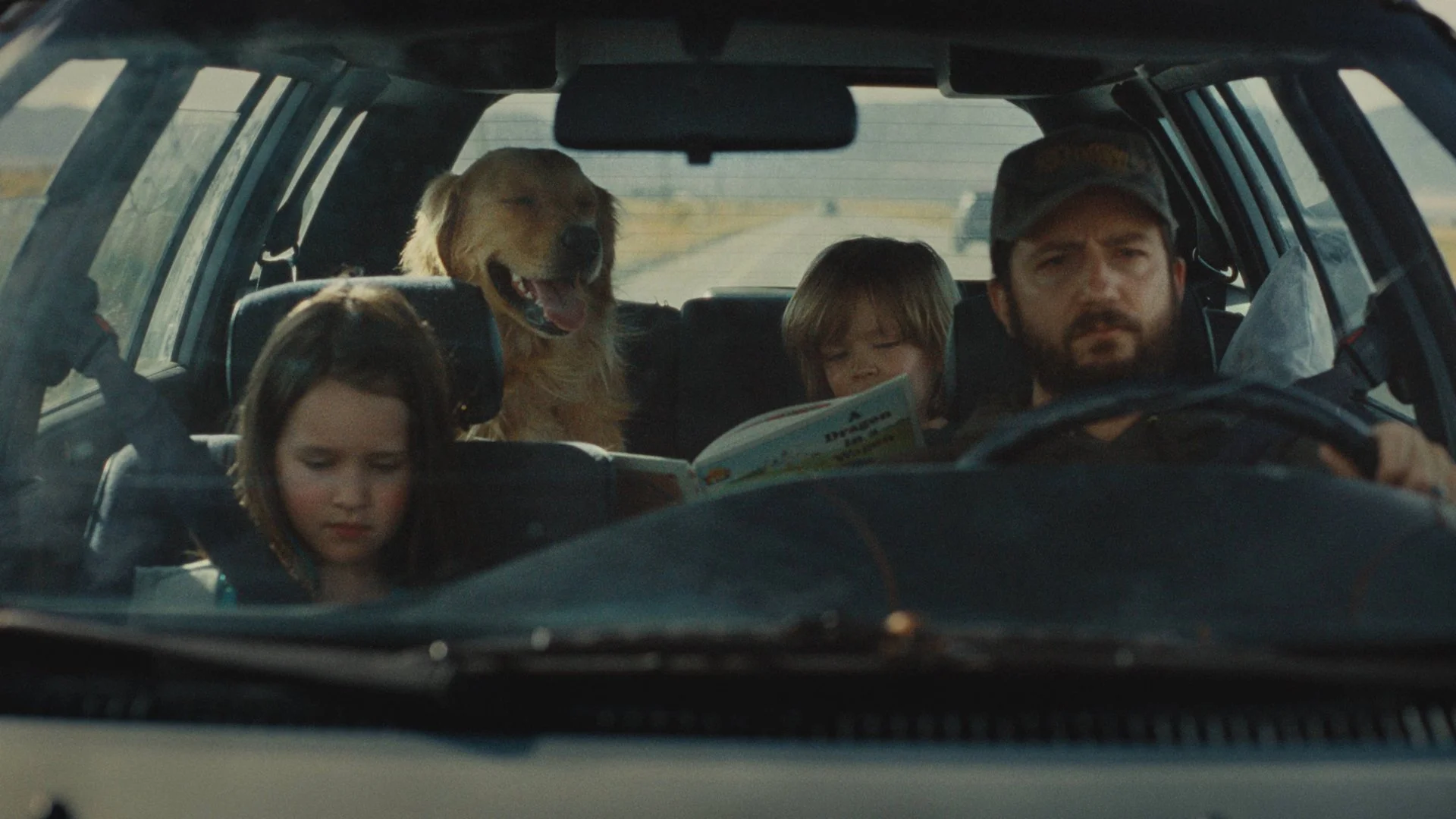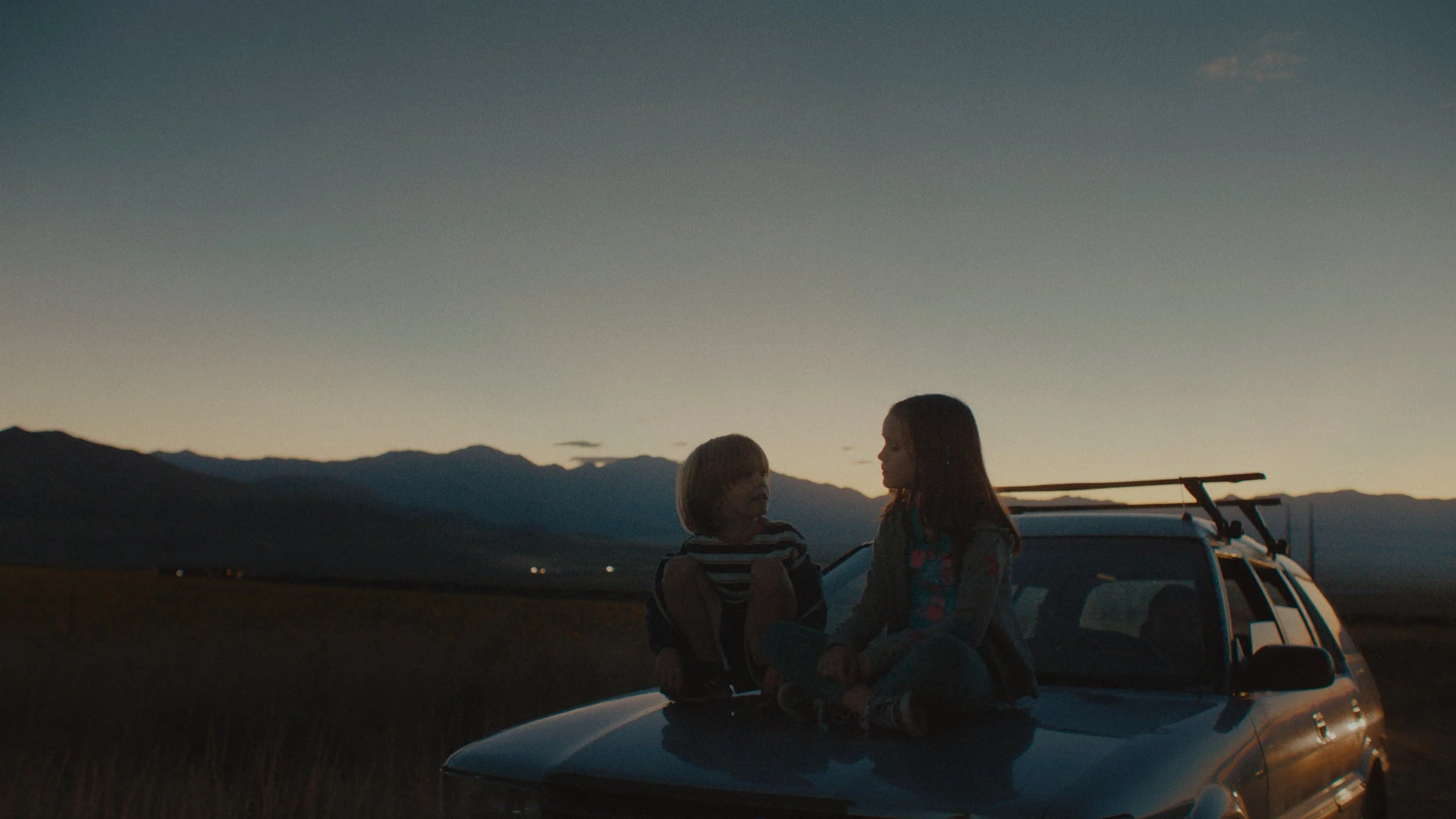'Omaha' Review: Shattering Road Trip Family Portrait is in Need of Substantial Character
Towards the tail end of my time at the Sundance Film Festival — well, in-person that is — the last movie I checked out was Cole Webley's directorial debut, Omaha. It is the tale of a widower (John Magaro) who takes his two young children to Nebraska for reasons unknown. Although I appreciated the filmmaking, which depicted this Middle America adventure as a grand slice-of-life road trip with lush cinematography and exceptional performances, it lacked substantial character. Consequently, the emotional swing of its finale, which revealed its secret knife to stab you in the heart, wasn't all that effective. I mean, I cried, but felt manipulated to do so. I'm a Pisces; those tears came out, but they weren't from deep down within.
Image copyright (©) Courtesy of Sundance Institute
MPA Rating: N/A
Runtime: 1 Hour and 23 Minutes
Production Companies: Sanctuary Content, Kaleidoscope Pictures, Monarch Content
Distributor: Greenwich Entertainment
Director: Cole Webley
Writer: Robert Machoian
Cast: John Magaro, Molly Belle Wright, Wyatt Solis, Talia Balsam
Release Date: N/A
Set in 2008, shortly after the passing of their mother, Ella (Molly Belle Wright) and Charlie (Wyatt Solis) are woken up by their father (John Magaro) and taken on a trip across Middle America alongside their golden retriever. The gas stations and hotels they stop at each day make Ella more curious and puzzled as to where they're going and why.
The Kids in Omaha Command the Screen
Omaha bears remarkable young performances from Molly Belle Wright and Wyatt Solis who portray the brother-sister duo. Molly Belle Wright is miraculous, as she oscillates between acting as the audience's avatar — sharing their growing confusion and dread, not knowing what lies at the end of the journey — and being an innocent 9-year-old kid. Wright stands out for her subtle expressions of sheer puzzlement during the intimate moments where Dad is acting a little too suspicious and being vague about what's happening. Ella is observant, but she is afraid to question her dad, who keeps his walls up. Wright uses every moment in front of the lens to make Ella's pensiveness and uncertainty painstakingly felt. She illustrates that dreadful sensation of knowing your childhood innocence is so close to being disrupted, which keeps your nerves tense throughout. Her pitch-perfect performance is even more impressive considering Wright is British.
Additionally, Wright plays the big sister energy so well, having to be the rule setter and best friend to Solis' Charlie, which results in adorable and poignant onscreen chemistry. There’s an unspoken responsibility to keep the spirit of innocence alive within her younger brother, despite hers slowly withering away as she becomes increasingly suspicious of what’s going on around their dad. So every location with them is a playground. Solis and Wright’s performances combine to deliver devastating and soul-crushing beats that drive you to tears. Molly is destined to go places, for her performance is nothing short of excellent.
The emotional swings in Omaha required more depth of character
Robert Machoian, who penned the complex The Killing of Two Lovers, now provides a straightforward road trip film that lacks character. The story breezes through a series of functional set pieces bolstered by Webley's filmmaking and Paul Meyers' beautiful photography of Middle America, adding a grandness of scope to this otherwise simplistic road trip. I was charmed by Ella teaching Charlie how to fly a kite on the salt flats of Utah and Dad encouraging Charlie's disgusting "would you rather" game during a stunning overhead shot of their car on the highway.
However, it appears that each scene hinges on Magaro and the kids’ improvisation to sell this portrait of a seemingly fine American family on the brink of disaster, rather than Machoian's writing. The script itself fails to provide them with clear personalities or lend any authenticity to the portrait. From the opening few scenes, which reveal that, unbeknownst to the children, the family is on their last financial leg, you know that the film is heading towards an inevitably devastating conclusion even when its darker underlying plot is yet to be fully revealed. I needed more than Magaro's aloof, secretive persona, and the many reminders of his financial situation to propel the story, especially given his talents as an actor.
Much of Omaha's narrative feels like reenactment intermissions in a much larger documentary, though I cannot say documentary on what without giving away the final turn. I can only assume that my contemporaries on the East and West Coasts aren't as aware of the significance of this issue, which makes me want to dig into the subject. However, as a narrative, even when the portrait reveals its true colors, it reads as a plot device designed to force you to shed a tear or two, rather than earning a reaction naturally derived from your bond with this family.
The film, up until its tipping point, is heavily dependent on John Magaro's performance, and it's not surprising that he delivers a striking emotional turn, proving he's an underrated actor who deserves more flowers than he gets. However, as much as I'm not a fan of his previous collaborator Kelly Reinhardt, I kept thinking, what if this story were under her lens? Much of Omaha shares traces of Wendy & Lucy — not because there's a dog here, silly— but it was distinct and honest in its execution, and Michelle Williams' Wendy had character. Omaha has archetypes. Despite the convincing camaraderie evoked by the ensemble's screen presence, it was not enough to sustain the story and the subject matter that it finally touched upon deserved more.
Rating: 2.5/5
Please consider supporting Rendy Reviews. We’re an independent run, Gen-Z and Black-owned entertainment outlet. You can donate to our Paypal or Venmo to help keep our site running. Or become a subscriber for access to 13-years worth of reviews, exclusive interviews, and more! A free way to support is a sign up for the Rendy Reviews’ newsletter and get weekly emails about latest on movie reviews, interviews with film artisans, features, and more.


